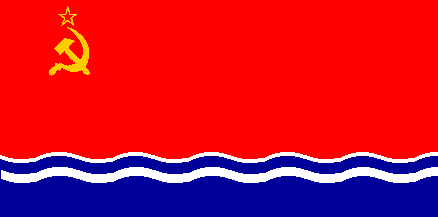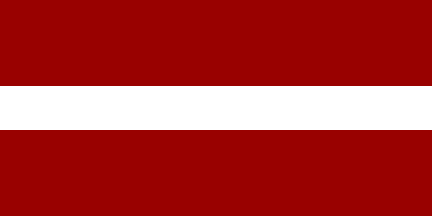
image by Željko Heimer, 17 Apr 1996 |

Last modified: 2025-01-11 by rob raeside
Keywords: latvia | latvian ssr | hammer and sickle (yellow) | star: 5 points (red) | star: 5 points (fimbriated) | riga | visu zemju proletārieši | savienojieties! | rīgas pilsēta | lenin |
Links: FOTW homepage |
search |
disclaimer and copyright |
write us |
mirrors

The Latvian SSR flag adopted 17 January 1953 was
reaffirmed by the Constitution adopted on 28 February
1967, along with a list of places and ways to fly it.
This list was expanded greatly by the “Instruction
Concerning the Application of the Statute on the State
Flag of the Latvian SSR” confirmed May 30, 1967 by decree
of the Council of Ministers of the Latvian SSR.
Dave Martucci, 05 Sep 1996, quoting from
“Soviet State Symbolism”, a special issue of
[tfb] The Flag
Bulletin XI:1 (Winter 1972): 138-145
Specs.: stripes unknown!; hammer-and-sickle placement and size unknown!
The thin white stripes seems to be due to a heraldic concern —
same thing for Lithuania and
Estonia, but not for the others…
António Martins, 19 Jun 2001
 image by Željko Heimer, 17 Apr 1996 | |
No hammer, sickle and star on the
reverse side.
Mark Sensen, 25 May 1997
Officially reverse looked like obverse without star and hammer-sickle.
But in fact I never saw these flags without star, hammer-sickle. Real flags
(all 15) usually were either with reverse analogous
to obverse (but with star and hammer-and-sickle near the hoist) or with
reverse = mirrored obverse.
Victor Lomantsov, 30 Nov 2002

I was aware at the time that Mikhail Gorbachev had decided to let
Latvia, Lithuania and
Estonia fly their 1918
national flags, in
addition to their S.S.R. flags.
John Crosby, 23 May 2001
Latvia achieved independence in
1990 by canceling all Soviet legislation between 1940 and 1990.
Dave Martucci, 05 Sep 1996
The emblem of the SSR was introduced 25 August 1940
(according to Hesmer [hes92])
and replaced by the current one
17 February 1990 (in force 27 February 1990).
M. Schmöger, 16 Sep 2001
lv.gif)
The book [hzg80] shows this design.
M. Schmöger, 08 Sep 2001
And so does an official soviet handbook publ. 1980
(SSSR — Administrativno-territorialhnoe Delenie Soûznyq
Respublik). Though showing the (not fimbriated, solid golden)
star slightly less “dense”.
António Martins, 27 Nov 2002
lv2.gif)
A third variant is depicted in on a cerimonial flag shown in
Enciklopedija (Rīga, 1988): The star is plain yellow and
only slightly dense (or not at all), and the sun is solid yellow, not
transparent.
António Martins, 06 Sep 2003
See also: City of Riga, Latvia.
 image by António Martins and Antonio Gutiérrez, 06 Sep 2003 | |
It’s Riga’s flag under soviet occupation till 1988. It did
not begin till 1954 but I’m not sure. Source: Enciklopedija,
Rīga, 1988 (in Latvian).
Guy Babonneau, 07 Mar 2001
It is rather a pendon, fixed to a wodden pole (suited for
carrying, apparently) with five ribbons and with a golden fringe in the
fly; height to width ratio is approx. 11:16; there is a golden vertical
criss-cross ornament along the fly on both sides. This flag is scarlet
(алый) and not purpure
(краповый),
comparing the background with the relevant parts of the emblem —
it was just photographed too darkly in the source book.
António Martins, 06 Sep 2003
The inscription on the reverse says «Rīgas pilsēta /
город Рига»,
which means "city of Riga" in Latvian and Russian, set in golden
fantasy capitals, bellow a depiction of the lavtian RSS
emblem.
António Martins, 06 Sep 2003
I have some doubts about this being the pre-1988 flag of Riga:
This is a cerimonial banner, suited for indoor
or parade display; that the only reference to the city is on the reverse
(the “not-main” side); and that there is a vacant space at the
bottom of the obverse — a space suitable for the costumary additions.
Moreover, all known soviet territorial flags other
than SSRs and ASSRs have been always unofficial — I think that
this one is not even that.
António Martins, 06 Sep 2003
 image by António Martins, 06 Sep 2003 | |
The inscription on the obverse is the soviet
motto and says «VISU ZEMJU PROLETĀRIEŠI,
SAVIENOJIETIES!», which means "Workers of the Wold,
unite!" in Latvian, above the black and white iconic
image of Lenin’s face (incl. golden laurel branch).
António Martins, 06 Sep 2003
Anything below this line was not added by the editor of this page.